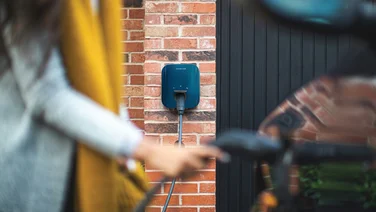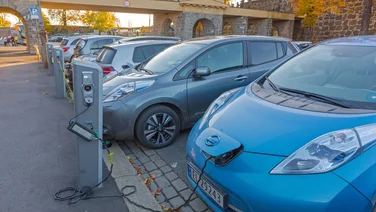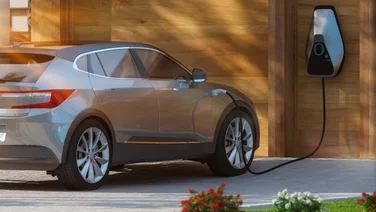- How much does it cost to install an electric car charger?
- How much does it cost to charge your electric car with a home charger?
- What factors affect the cost of an electric car charging point?
- What government grants are available for EV chargers?
- Choosing where to install an EV charger
- Summary: Is it worth buying a home charger for your electric car?
- How do I start installing an EV charger?
- An electric vehicle charger costs £1,000, on average
- You’ll typically save £467 per year by charging at home instead of in public
- Modern chargers will fully charge your car overnight
If you are considering getting yourself an electric vehicle, one thing you’ll want to think about is whether you’ll want the option of charging your car at home rather than at the pump public charging station. Buying an electric vehicle (EV) charging point for your home can save you money over time, and make your life much easier.
Charging your EV from home is much cheaper than charging in public. You’ll cut your recharging costs by £467 per year compared to using public chargers – a saving worth making, especially in this cost of living crisis.
You can also set some chargers so that they only charge your car at times when electricity is cheapest (during off-peak times), saving you even more money.
Plus, by charging at home, is convenient, and can be done overnight from the safety of your driveway. You won’t have to deal with driving to a public charging station in the hopes of finding a free spot.
It’s easy to compare home charger prices, with our help. Simply provide a few quick details, and our expert installers will be in touch with free quotes for you to compare.
How much does it cost to install an electric car charger?
It’ll usually cost you between £800 and £1,200 to buy and install an electric car charging point on your property.
If you use an installer from the company selling you a charging point, it’ll cost you the same kind of price no matter where you are in the UK.
It might be cheaper to hire an independent electrician, but make sure they’re familiar with installing EV chargers.
| Charger type | Time to full battery | Price with installation | Price without installation |
|---|---|---|---|
3.6 kW | 19 hours | £800 | £480 |
7 kW | 10 hours | £1,000 | £600 |
22 kW | 3 hours | £1,200 | £720 |
Unable to install a charger at home? See what your other options are on our page: Can You Charge Your Electric Car At Home With No Driveway?
The cost of tethered vs untethered chargers
The main difference between these two types of chargers is the cable. Tethered chargers have a fixed cable, whereas untethered chargers have a cable that can be detachable.
Untethered chargers usually cost £20 less than tethered chargers. They are also more versatile, as you can swap out the cable in the future should you need a longer one.
Many companies will include a tethered charger in the cost of your installation without giving you the option of an untethered charger.
Because they have a detachable cable, untethered chargers can be used in more situations, but they’re also more likely to be stolen.
Luckily, many now come with security features like cable locking or the option to add a PIN.
Get free EV charging point quotes
Answer a few quick questions, and our trusted installers will send you bespoke EV charging point quotes – for free.
How much does it cost to charge your electric car with a home charger?
According to HomeServe UK, costs £610 per year to charge your electric car at home, on average, compared to the typical cost of charging in public, which is £1,077 per year.
The total figure will, of course, vary depending on how much you drive, the type of electric car you have – newer models cost less to drive – and the cost of electricity on your home tariff.
The average cost of electricity at home is 24.50p per kWh, whereas at a charging station, it’s around 77% more expensive, though some supermarkets offer cheaper prices.
Although you will spend on average £1,000 on a home charger, you will likely make this back over 1-2 years, depending on how much you drive your car and your energy prices.
Remember that when you use a home charger, you can take advantage of charging when you want, for example, overnight, when energy prices are lowest. Or, of course, consider installing solar panels to get some “free” juice.
What factors affect the cost of an electric car charging point?
The factors that affect the cost of an electric car charging point are the speed, brand, number of smart features, and aesthetics.
- Speed: Slow chargers suit most domestic users and are usually much more affordable. On average, a rapid charger costs £400 more than a slow charger
- Brand: Many companies will charge you more for the same basic product, but some brands are more expensive than others. Read our Best Home EV Chargers guide before making your final decision
- Smart features: Most chargers have optimised charging, only charging at the cheapest possible, but some also have a remote locking feature or can use solar energy to charge your vehicle
- Aesthetics: It may cost you extra if you want your charger to look extra sleek or be a specific colour.
- Unusual extra costs: If your driveway is far from your fuse box, the installer may charge extra for additional cable. Thick stone walls may also increase installation time and cost.
Will the costs of a home EV charger decrease over time?
The cost of any technological innovation tends to decrease over time, and we can expect the same to be true of electric vehicle home chargers.
It’s already hundreds of pounds cheaper to buy a 3.6 kW charger than it was just a few years ago – and as 7 kW and 22 kW chargers become increasingly common, prices should fall even further.
Unfortunately, the EVHS grant ended for house owners in March 2022, which removed a £350 discount.
What government grants are available for EV chargers?
There are a few government grants available for EV chargers, although most are for businesses and local authorities.
These include the Workplace Charging Scheme and the On-street Residential Chargepoint scheme.
For home EV chargers, renters and people who own a flat can use the Electric Vehicle Homecharge Scheme (EVHS).
This government grant reduces the cost of a new charging point by 75%, up to £350 (including VAT).
You can find out more about all the EV charging grants on our page.
Even if you aren’t personally eligible for most of them, you can always write to your council or workplace to encourage them to use grants to install electric vehicle chargers in your area.
Choosing where to install an EV charger
When considering installing a home EV charger, there are a few things you need to consider first:
- Convenience: The charger needs to be accessible so you can easily connect your car
- Safety: It might be best to have your charger out of sight, in a garage
- Hazards: It’s also best to position it somewhere you won’t trip over the wires.
- Connectivity: For some systems, you’ll need to connect your charger to your Wi-Fi, so choose a location accordingly.
- You can plug your car into a standard domestic socket, which will charge up slowly. We wouldn’t recommend this, though. A dedicated EV charger is quicker, safer, and cheaper, as most products can now charge your car when electricity is cheapest.
- Cost: Electric car chargers for businesses usually cost between £700 and £1,000 per charger.
Find out everything else you need to know with our guide to electric car charging points for businesses.
How do I install an EV charger?
Your installer will attach the EV charger to the wall of your choice with a drill, screws, and possibly silicone sealant and run the length of cable to your consumer unit (fuse box) – either through the wall or around the outside – before connecting up all the electrics.
The installer will discuss the potential locations for your charger beforehand. Keep in mind that it needs to be at least 2.5 metres away from any metal object connected to your electricity supply.
It also legally needs to be at least two metres away from a public highway, monument, or listed building, though that comes up less often.
Any electrician might be able to competently install a car charger, but you shouldn’t take that risk. Instead, choose an installer who’s registered with the Office for Zero Emission Vehicles.
You’ll get an accredited electrician, and you’ll be eligible for any government grants that exist at the time.
Can I install my own EV charging point?
While you can technically install an EV charger yourself, it’s best not to, unless you’re a trained electrician.
If you don’t have the correct skills and experience, installing a charger yourself could result in an injury, an unsafe charging set up (you could unintentionally create a fire hazard), or a charger that doesn’t work.
Plus, the industry-standard three-year warranty most EV chargers have might not be valid if you don’t recruit a professional to install the charger.
Do I need permission to install an EV charger?
In most cases, you do not need permission to install an EV charger.
You can install a charger that’s less than 1.6 metres tall without planning permission, as long as it’s installed more than two metres from a highway, thanks to the Town and Country Planning Act of 2015.
This includes practically all slow and fast charging points. However, some rapid chargers are taller than 1.6 metres, and therefore do require permission.

Summary: Is it worth buying a home charger for your electric car?
Yes, it’s worth buying a home charger if you have a driveway or garage that can accommodate one. Here are a few of the main reasons why:
- It is definitely worth buying a home charger if you have a driveway or garage.
- You should break even on your £1,000 expense in around two years through savings.
- Charging in public is 77% more expensive than charging at home.
- On average, you’ll save £467 per year by purchasing a home charging point.
- It is twice as expensive to refuel a petrol car compared to charging an electric vehicle at home over a year.
- 47% of Brits have purchased low-carbon tech in the past 12 months (according to our National Home Energy Survey).
How do I start installing an EV charger?

- We recommend a 7 kW charging point: typically £600 for the charger and £400 for installation.
- Installation cost breakdown:
- Initial survey to assess property suitability and plan location (usually free).
- Professional sets up the charger in a garage or driveway, running up to 10 meters of secure cabling to the fuse box and fitting a safety cut-off device.
- Hardware costs around £100.
- Some chargers may require an earthing rod, which can increase cost and disruption.
- The installer tests the charger to ensure it works.
- A labour cost of £300 is reasonable, considering the expertise protecting you from potential issues.
- Professional installation is crucial to avoid expensive repairs.
- Savings from home charging should outweigh initial costs.







